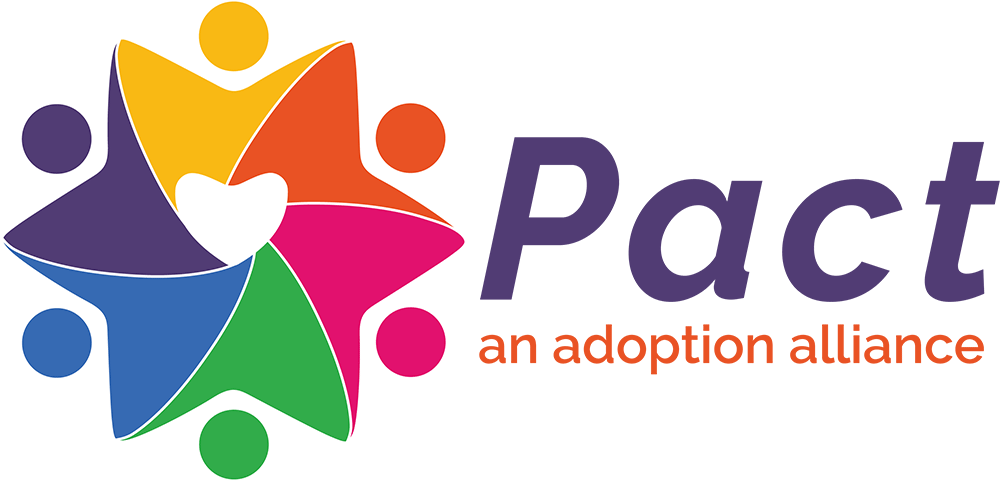2014
Families often consult Pact about how to tell their communities when they have a new baby join their family through adoption. Adoptive parents James and Heidi sent the following letter to parents and teachers in their school community, and gave us permission to share it. We think their approach toward supporting their children and explaining adoption to well-intentioned—but not always well-informed—friends is a great example that will prove valuable to many of us.
Hi all,
Some of you already know, but we wanted to share the news with everyone that last weekend, Jonah became a big brother.
We’ve been in the waiting-to-adopt process for over two years, and last Friday we were matched with an expectant mother. She was due in a week, but went into labor Saturday. We jumped on a plane and were able to be present for our new son Elijah’s birth. We got to come home Thursday!!
Jonah tells us he wants to take his time sharing the news with his friends, so we’re going to let him lead the way and go at his own pace with his pals at school. But we wanted to make sure that grown-ups heard from us.
Ms. Hale (Jonah’s teacher) also thought it could be good to share a little bit about how we talk about adoption with Jonah. We know that your kids may have questions (and grown-ups might, too), and while adoption is something we talk about all the time in our family, it can be something that ties tongues for those with less experience.
Jonah and Elijah’s adoptions are both open, meaning that we have contact now, and will have ongoing contact with their birth families (especially their birth mothers). Both boys will always know that they were adopted, and will know as much as is developmentally appropriate about their birth families and their adoption stories. Before Friday, that meant that Jonah knew we were waiting for an expectant mom to choose our family just like his birth mom picked us to be his parents six years ago.
This past week, it’s meant that Jonah knew that Elijah’s birth mom was making a decision about whether or not she was able to be the “mommy” for her baby. And that, if she decided she wanted another family to be Elijah’s parents and big brother, she was going to pick us. He also knew that because having a baby is hard work, and making the decision is really hard, that she couldn’t make the decision and sign the papers until three days after Elijah was born. Jonah did a very good job holding all of that excitement and uncertainty!
It also meant that once Elijah’s birth mother signed, Jonah asked why she didn’t “want” to be the mommy for Elijah. We told him that all parents, including every birth parent we have ever known or heard about, love their children so much and have big hopes and dreams for them, and that Elijah’s birth mom has big hopes and dreams for both her two-year-old son, whom she is parenting, and for Elijah. But because she doesn’t have a lot support and she’s parenting by herself, she felt worried that it would be really hard to have all of her hopes and dreams come true for both boys if she tried to parent them both. We reminded him that this was also why his own birth mom decided to have us be his parents, so that all of her hopes and dreams for him and her other son (whom she is parenting) could come true.
Beyond the particulars of our family story there are a few other ways of talking about things we try to keep in our minds and hearts:
Sometimes people tell adopted adults and children that they are “lucky” to be adopted. Jonah and Elijah aren’t lucky, any more than a child who is born to any family is lucky that his/her parents are parenting him or her. We didn’t adopt them to be charitable— they would have been loved and cared for in their birth families, but many other things, including time and resources, might have been a challenge. We feel that we are the lucky ones. We adopted because we wanted to be parents, not because we wanted to do a good deed.
We’re Jonah and Elijah’s real parents and so are their birth parents. Sometimes the world tries to distinguish between birth and adoptive parents or brothers and sisters by using the term “real,” but this actually creates problems for kids who might think they have to fit their notion of family—whatever it might look like—with the ideas of others outside their family; and it encourages them to deny or measure one family against the other. We all love the boys, and we all are valuable and important, but we play very different roles in their lives.
Thanks for your support during this exciting time of transition in our family. We are so glad Jonah has such a supportive school community to be part of this journey.
We’re happy to answer questions any time.
Heidi and James
